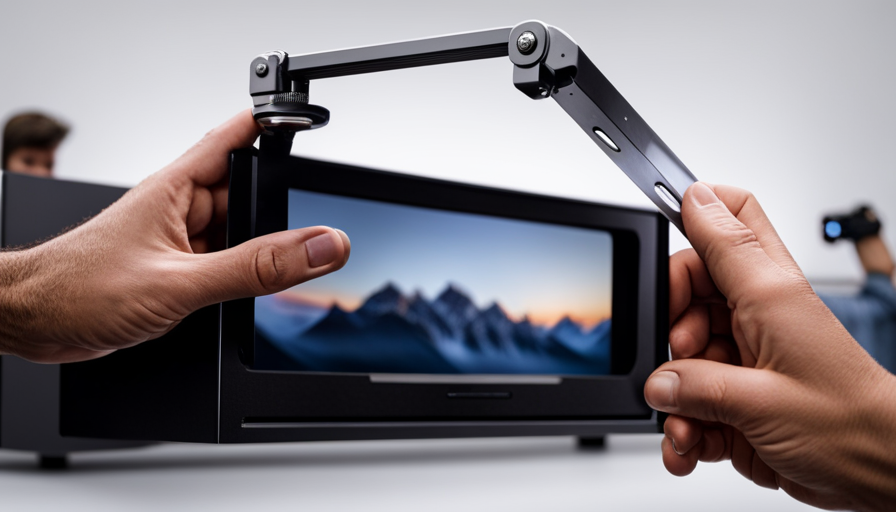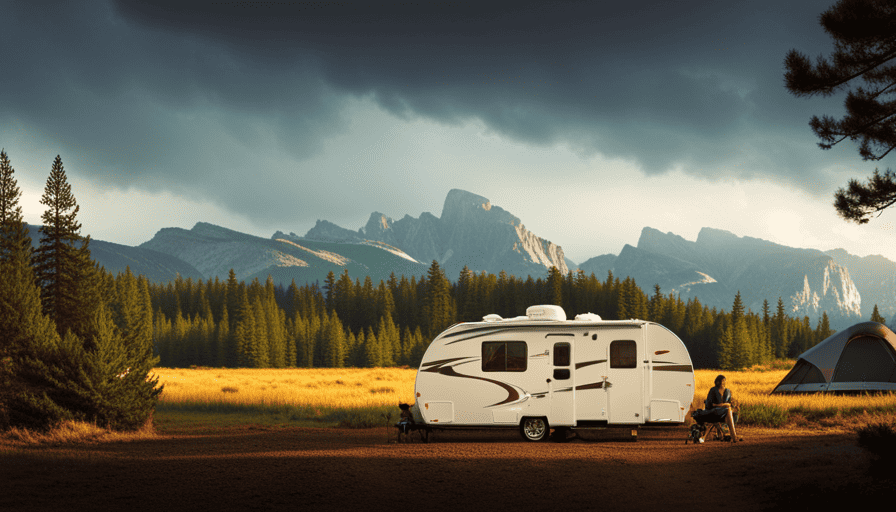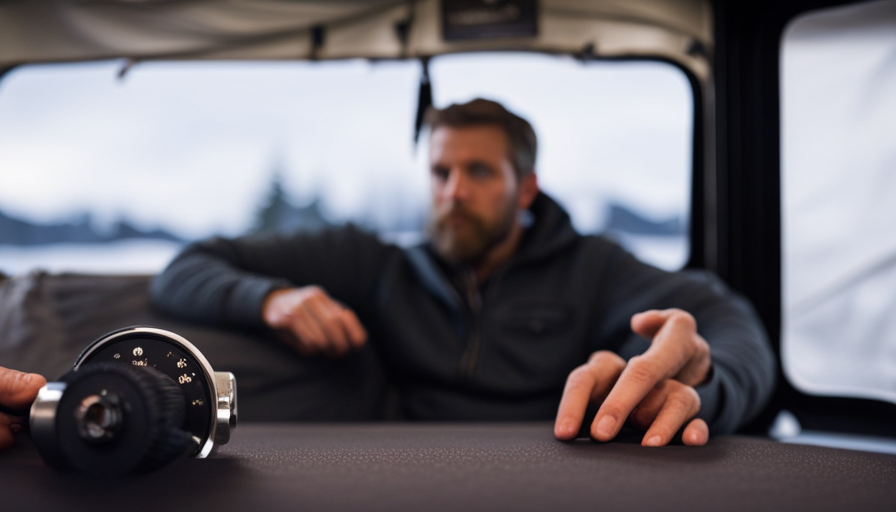So, you have decided to embark on an exciting camping trip in your trustworthy camper. The joy of hitting the open road, exploring new places, and admiring the beauty of nature awaits you. But wait, what is that sound of rustling? Could it be? Indeed, fellow adventurers, it is the dreaded mouse. Although these tiny creatures may seem harmless, they have the ability to wreak havoc on your camper if given the chance. Fear not, my fellow travelers, as I am here to guide you in mastering the art of protecting your beloved mobile home from mice.
In this article, I will share with you my extensive knowledge and practical tips on how to keep those pesky rodents at bay. From sealing entry points to using natural deterrents, I’ve got you covered.
We’ll delve into the importance of storing food properly, cleaning regularly, and securing exterior wiring and plumbing. And of course, we’ll discuss the tried and true methods of setting traps and using mouse repellents.
So, strap on your tool belt and get ready to defend your camper against the cunning and crafty mice. With a little know-how and some preventive measures, you can ensure a mouse-free camping experience.
Let’s get started!
Key Takeaways
- Seal entry points with weatherstripping and caulk
- Use wire mesh or steel wool to cover gaps in the undercarriage
- Store food in airtight containers and clean up spills and crumbs promptly
- Regularly clean and declutter the camper
Seal Entry Points
You need to seal all entry points if you want to keep those pesky mice out of your camper and finally have peace of mind on your next adventure. Rodent prevention is a crucial aspect of camper maintenance, and sealing entry points is the first step towards achieving it.
Mice can fit through incredibly small openings, so it’s important to thoroughly inspect your camper for any potential entry points. Start by checking the exterior for gaps around windows, doors, and vents. Use weatherstripping or caulk to seal any openings you find.
Don’t forget to inspect the underside of your camper as well, as mice can enter through gaps in the undercarriage. Cover these gaps with wire mesh or steel wool to keep them out.
Additionally, pay attention to the interior of your camper. Check for cracks or holes in walls, floors, and cabinets, and seal them with expanding foam or silicone caulk.
By sealing all entry points, you can significantly reduce the chances of mice finding their way into your camper.
Now, let’s move on to the next important step: storing food properly.
Store Food Properly
When it comes to keeping those little critters out of your mobile abode, it’s crucial to make sure your food is stored in a way that would make Fort Knox jealous. Preventing infestation and proper food storage are key to keeping mice away from your camper.
Here are three essential tips to ensure your food stays safe and secure:
-
Use airtight containers: Invest in airtight containers to store all your dry goods, such as cereals, pasta, and snacks. Mice are skilled at chewing through flimsy packaging, so sealing your food in airtight containers will make it nearly impossible for them to access it.
-
Store food off the ground: Avoid keeping food on the floor or low surfaces. Instead, use elevated shelves or storage containers to keep your food at a higher level. Mice can easily climb and jump, so keeping your food elevated will make it harder for them to reach it.
-
Clean up spills and crumbs promptly: Mice are attracted to food remnants, so it’s important to clean up any spills or crumbs immediately. Wipe down countertops, sweep the floors, and vacuum regularly to eliminate any food traces that may entice mice into your camper.
By following these guidelines for proper food storage, you can greatly reduce the chances of a mouse infestation in your camper. Now, let’s move on to the next step and discuss how to clean and declutter regularly to further prevent these unwanted guests.
Clean and Declutter Regularly
To keep your mobile abode critter-free, it’s essential to maintain regular cleanliness and decluttering. Regular pest control and rodent proof storage solutions are key in preventing mice from infesting your camper. Cleaning and decluttering your camper not only eliminates potential hiding spots for mice, but it also helps you identify any signs of rodent activity early on.
When it comes to cleaning, be sure to regularly sweep and vacuum all areas of your camper, paying special attention to corners, closets, and storage compartments. Wipe down surfaces with a disinfectant to remove any food residue or odors that may attract mice. Additionally, decluttering your camper will minimize potential nesting sites for rodents, making it harder for them to settle in.
To further enhance rodent prevention, consider implementing rodent proof storage solutions. Use airtight containers to store food and dispose of garbage promptly. Seal any small openings or gaps in your camper where mice could potentially enter, such as around pipes, vents, or windows.
By maintaining cleanliness and decluttering regularly, you can significantly reduce the chances of mice infesting your camper. In the next section, we will explore the use of mouse repellents to further protect your mobile abode from these unwanted guests.
Use Mouse Repellents
Enhance your protection against unwanted critters by using mouse repellents in your mobile abode. When it comes to alternative mouse prevention methods, using repellents is an effective way to keep these pesky creatures away. Here are five mouse repellent products that you can consider:
-
Ultrasonic repellents: These devices emit high-frequency sounds that are inaudible to humans. They deter mice by creating an uncomfortable environment for them.
-
Peppermint oil: Mice dislike the strong smell of peppermint oil, making it an excellent natural repellent. Simply soak cotton balls in the oil and place them strategically around your camper.
-
Mothballs: While primarily used to repel moths, the strong odor of mothballs can also keep mice away. Just be cautious when using them, as they can be harmful if ingested by pets or children.
-
Dryer sheets: Surprisingly, the scent of dryer sheets can act as a deterrent for mice. Place them in areas where mice are likely to enter, such as near doors or windows.
-
Rodent repellent sprays: These sprays contain natural ingredients that mice find unpleasant. By spraying them in areas prone to infestation, you can create a barrier that mice will avoid.
By incorporating these mouse repellent methods into your camper, you can greatly reduce the chances of a mouse invasion. However, if you still find mice in your camper despite using repellents, it may be time to set traps to catch them.
Set Traps
Make sure you set traps strategically to catch any unwanted critters in your mobile abode. When dealing with mice, it’s important to understand their behavior in order to effectively control them.
Mice are curious creatures that are attracted to food sources and warm areas, which makes your camper an ideal target for them. One of the most common traps used for mice is the snap trap. These traps are effective because they quickly and humanely kill the mouse upon activation.
Another option is the glue trap, which captures the mouse alive but can be a bit messier to deal with. Additionally, there are alternative rodent control methods available, such as electronic traps or ultrasonic repellents. These devices use sounds or vibrations to deter mice from entering your camper. However, it’s important to note that no trap or repellent is completely foolproof, so it’s best to use a combination of methods for optimal results.
Once you’ve set your traps, it’s time to move on to the next step: installing mesh screens on vents and openings to further prevent mice from entering your camper.
Install Mesh Screens on Vents and Openings
Installing mesh screens on vents and openings in your mobile abode can significantly reduce the likelihood of unwanted critters finding their way inside, providing an effective barrier to keep your living space critter-free. Did you know that, according to a study, homes without proper mesh screens have a 30% higher chance of experiencing rodent infestations?
To further mouse-proof your camper, consider installing rodent-proof flooring. This specialized flooring is designed to prevent mice from burrowing through and accessing your living space. It creates an additional layer of protection, ensuring that no pesky rodents can make their way inside.
Another effective method to deter mice is by using ultrasonic pest repellents. These devices emit high-frequency sound waves that are inaudible to humans but irritate and repel rodents. Simply plug them into your camper’s electrical outlets, and they’ll create an invisible barrier that keeps mice at bay.
Now that you’ve installed mesh screens, rodent-proof flooring, and ultrasonic pest repellents, it’s time to tackle the next step in mouse-proofing your camper. Secure exterior wiring and plumbing are crucial to prevent mice from entering your mobile abode through these openings. By sealing any gaps and using protective covers, you can ensure that your camper remains critter-free and your peace of mind intact.
Secure Exterior Wiring and Plumbing
To keep critters at bay and maintain your peace of mind, it’s crucial to ensure the exterior wiring and plumbing of your mobile abode are securely sealed and protected. When it comes to mouse-proofing your camper, it’s not just about keeping them out, but also protecting the insulation and reinforcing the exterior walls.
Start by inspecting all exterior wiring and plumbing connections. Look for any gaps or openings that mice could squeeze through. Seal these gaps with a strong adhesive or silicone caulk to prevent any unwanted guests from entering. Pay special attention to areas where wires or pipes enter the camper, as these are common entry points for mice.
Next, reinforce the exterior walls of your camper. Mice can easily chew through weak or damaged walls, so it’s important to make them as sturdy as possible. Consider using metal mesh or hardware cloth to cover any vulnerable areas. This will provide an extra layer of protection against mice trying to gnaw their way in.
By protecting your insulation and reinforcing your exterior walls, you can effectively mouse-proof your camper. This will not only keep critters out but also help maintain the structural integrity of your mobile abode.
In the next section, we’ll discuss how to keep the surrounding area clean and clear, which is another important step in preventing mice from taking up residence in your camper.
Keep the Surrounding Area Clean and Clear
Maintaining a clean and clutter-free area around your mobile home is essential in deterring unwanted critters from making it their home. Proper waste disposal is crucial to prevent attracting mice. Make sure to dispose of trash regularly and keep garbage cans tightly sealed.
Additionally, eliminate any potential nesting spots by removing piles of wood, leaves, and other debris. These can provide cozy hiding places for mice. Regularly inspect the perimeter of your camper for any cracks or openings that could serve as entry points for rodents, and seal them off with caulk or steel wool.
In addition to keeping the area clean, using natural deterrents can further discourage mice from invading your camper. For instance, peppermint oil has a strong scent that mice find repulsive. Soak cotton balls in peppermint oil and place them strategically around your camper, particularly near potential entry points. This will help deter mice from coming near your vehicle. Another natural option is to plant mint or lavender around your camper, as these plants also have strong scents that mice dislike.
By maintaining a clean and clear area around your camper and using natural deterrents, you can significantly reduce the chances of mice making themselves at home in your mobile home.
Use Natural Deterrents
Create a fragrant barrier around your mobile home by strategically placing cotton balls soaked in peppermint oil near potential entry points, deterring unwanted critters from invading your space. Natural deterrents are a safe and effective way to keep mice away from your camper without relying on harmful chemicals.
Peppermint oil is known for its strong scent, which mice find unpleasant and avoid. To use this method, simply soak several cotton balls in peppermint oil and place them near openings such as doors, windows, and vents. Additionally, you can sprinkle a few drops of peppermint oil on cotton swabs and tuck them into small crevices and corners where mice may try to squeeze through.
If you prefer alternative methods, there are other natural deterrents you can try. Mice dislike the smell of certain herbs and spices, such as cloves, cayenne pepper, and garlic. You can create a mixture of these ingredients and sprinkle it around your camper to deter mice. Another option is to use ultrasonic devices that emit high-frequency sounds that are unpleasant to mice but inaudible to humans. These devices can be placed in strategic locations inside your camper to keep mice away.
In the next section about regularly inspecting and maintaining your camper, we’ll discuss how to identify and seal any potential entry points to further prevent mice from entering your living space.
Regularly Inspect and Maintain Your Camper
Now that we’ve discussed using natural deterrents to keep mice away from your camper, let’s move on to the next step in mouse-proofing: regularly inspecting and maintaining your camper.
This is crucial in preventing mice from entering and making a cozy home in your vehicle. One of the first things you should do is inspect for any potential entry points. Check for gaps or holes in the exterior of your camper, including around windows, doors, and vents. Seal any openings with caulk or steel wool to prevent mice from squeezing through.
Next, it’s important to inspect and repair any leaks in your camper. Mice are attracted to water sources, so fixing leaks will not only prevent water damage to your camper but also deter pests. Inspect the roof, windows, and plumbing for any signs of leakage and address them promptly.
In addition to inspections, implementing pest control methods is crucial. This can include setting up mouse traps in strategic locations, using repellents such as peppermint oil or mothballs, and regularly cleaning your camper to remove any food sources that may attract mice.
By regularly inspecting and maintaining your camper, you can ensure its mouse-proofness and enjoy a pest-free camping experience.
Frequently Asked Questions
How do I know if I have a mouse problem in my camper?
Oh boy, let me tell you, if you have a mouse problem in your camper, you’ll know it! Those little critters can wreak havoc and leave behind quite the mess. But fear not, I’ve got some tips to help you prevent mice from entering your camper and spot the signs of a mouse infestation.
From sealing up any gaps to keeping food stored properly, I’ll make sure those pesky mice stay far away from your camper.
Are there any specific types of mouse repellents that work better than others?
There are several types of mouse repellents available, but their effectiveness can vary. Natural mouse repellents, such as peppermint oil or mothballs, are commonly used, but their effectiveness may be limited and they may need to be reapplied frequently. Other options include electronic ultrasonic repellents or mouse traps. It’s important to note that while repellents can help deter mice, the best way to prevent them from entering your camper is by sealing off any entry points and keeping your camper clean and free of food sources.
Can I use regular household cleaning products to clean my camper and deter mice?
Can regular household cleaning products really keep mice away from your camper? While these products may help with general cleanliness, they aren’t effective in deterring mice. To truly mouse-proof your camper, you need to employ specific techniques and products designed for that purpose. Sealing any openings, using rodent-proof materials, and setting up traps are some effective methods. Don’t rely solely on cleaning products; invest in proper mouse-proofing techniques for a pest-free camper.
How often should I inspect and maintain my camper to ensure it remains mouse-proof?
I inspect and maintain my camper regularly to ensure it remains mouse-proof. I find that conducting inspections every few months is effective in catching any signs of mice or potential entry points.
During these inspections, I thoroughly check for any holes or gaps in the exterior, as well as inside the camper. Additionally, I use effective mouse prevention methods such as sealing any openings, storing food properly, and using repellents.
This proactive approach helps me keep my camper mouse-free.
Are there any specific steps I should take to secure exterior wiring and plumbing to prevent mice from accessing them?
To secure exteriors and protect wiring and plumbing from mice, there are several effective prevention methods.
First, ensure all exterior openings are properly sealed to prevent mouse entry. Use wire mesh or steel wool to cover any gaps or openings.
Additionally, consider using effective repellents such as peppermint oil or ultrasonic devices.
Regularly clean the camper using deterrence products to remove any enticing smells.
Lastly, conduct regular inspections and maintenance to identify and address any potential entry points or damage.
What are the Best Methods for Mouse-Proofing a Camper?
When it comes to mice prevention for camper, the best methods include sealing any gaps or cracks with steel wool and caulk, storing food in airtight containers, placing rodent repellent pouches in key areas, and setting traps strategically. Regularly cleaning and inspecting the interior and exterior of the camper is also crucial in keeping mice at bay.
Conclusion
In conclusion, mouse-proofing your camper is absolutely essential if you want to avoid a full-on rodent invasion. These pesky little critters can wreak havoc on your belongings and even pose health risks.
By diligently sealing entry points, storing food properly, and using repellents, traps, and natural deterrents, you can ensure a mouse-free haven for your camping adventures.
So don’t wait until you’re sharing your sleeping bag with a furry friend – take action now and keep those mice at bay!










